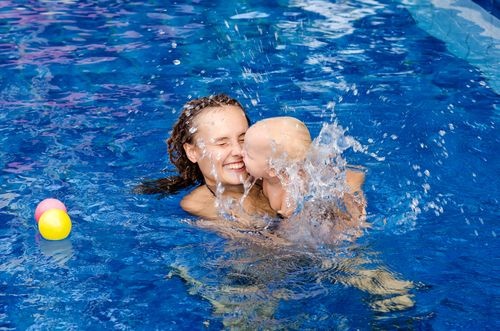
Saltwater purification lies among many effective methods of home pool purification. In current years eco-consciousness has come into the forefront of many homeowners needs. If you have considered altering your current pool detoxification routine please spend some time to educate yourself about a few facts in regards to saltwater pools versus one traditional method – chlorine.
It may be a little more expensive up front, but will save insurmountable funds in upkeep costs. After a quick search online, results show that a 2 pound bucket of pool chlorine costs about fifteen dollars. A large pool may cost hundreds of dollars to maintain each summer. App.com says this about saltwater pools, “those who make the shift can see their maintenance cost fall from more than $500 a year to about $100 a year”, which of course is a dramatic difference. Furthermore, Homeminders explains that, “The price of chlorine has increased by 40% in the last year, and continues to go up. For owners of chlorinated systems, that’s only the beginning”. So, it seems that saltwater really helps pool owners save some extra cash that cool be put to much better use during the sweltering summer months.
Maintenance is minimal. Saltwater pool enthusiasts have the luxury of only checking their pool chlorine levels about once a week or so. Salt creates a natural chlorination in the water which eliminates naturally occurring fungus, algae, and bacteria in the water. Normal chlorinated pools require daily checking of pH levels to ensure proper sanitization. According to Blue Haven Pool’s information on saltwater purification, “Through electrolytic conversion of natural salt, the Sanitizer produces a stable, absolutely pure, incredibly efficient form of non-liquid chlorine”. This means that you won’t have to worry about bacteria sprouting up in your pool overnight or acidic balances getting out of whack and burning the skin.
Saltwater is gentle on skin and hair. Some may argue that saltwater dries the skin out, which may be minutely true, but the effects of chemicals, such as chlorine, on the skin are much more severe. The Livestrong foundation examines the effects of chlorine on swimmers. Their findings are said to include acne issues, dry and cracking skin, premature aging, chronic rashes, and studies have even shown chlorine could be a cause of cancer.
Swimming in a saltwater pool is just like taking a dip in the ocean (saltwater pools actually contain much less salt than the ocean of course). You may feel the need to moisturize the skin and/or rinse off after floundering around, but unless you are prone to reactions when exposed to salt there shouldn’t be any more drying than usual. Many actually prefer the feeling of saltwater on the skin and say it leaves them with less odor and softer skin.
Saltwater purification is also kinder on the eyes and lungs. Some with asthma and other breathing sensitivities have a hard time swimming in traditionally chlorinated water. However, with saltwater purification there are no chemicals. The New York State Department of Health explains that chlorine reacts with the water on our in our bodies immediately upon inhalation, skin contact, or swallowing and begins to damage the cells of the body. In addition, Kids and pets can feel free to swim to their heart’s content in a saltwater cleansed pool without worry of ingesting nasty cleansers.
It should be noted that some sources say that saltwater pools will cause corrosion of nearby materials and/or the pool materials over time. However, this can easily be combatted by choosing which materials to use when building your pool and deciding which items are necessary to keep very close to the spray radius of the pool. Corrosion of pool materials is a natural occurrence with any pool, but some say that saltwater will cause this to happen a little faster. Make sure to do research on your pool before making the switch, but know that the benefits of saltwater on the earth, our bodies, and the wallet sure seem to outweigh any negative side effects.
by Ahmad Hassan



